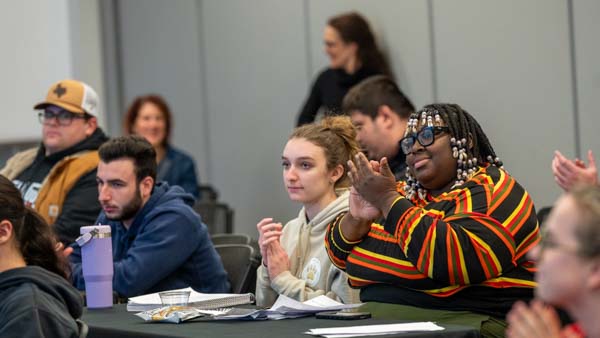For Shastri Akella, one of the fascinating parts of being an author involves bringing characters into existence and sharing their stories with readers. Akella, a former History, Literature, and the Arts lecturer who taught courses in creative writing and literature, currently works at Michigan State University and returned to Bryant on March 27 to discuss the process and craft that brought his debut novel, The Sea Elephants, to life.
“Twelve years back if someone told me, ‘You’re going to be a writer professionally and not just as a hobby,’ I wouldn’t have believed them,” said Akella who, prior to pursuing an MFA in creative writing and a Ph.D. in comparative literature, held a degree in computer science and worked for Google.
The Sea Elephants, which Macmillan released in July 2023, tells the story of Shagun, a young queer man who joins a street theater troupe after running away from home when his father threatens to send him to conversion therapy. Set in 1990s India, Shagun performs Hindu myths with the troupe and is traveling from place to place when he meets Marc, a Jewish migrant photographer. The two fall in love, but Shagun’s fear and guilt hold him back from claiming his own happiness.
Akella’s visit was part of the College of Arts and Sciences’ Visiting Writer Series, which focuses on social justice, difficult dialogues, diversity, and the inclusion of people of many experiences and identities. In the last three years, the program has reached more than 2,000 students, faculty, and staff. During Akella’s return to campus, he held a master class in writing for students, faculty, and staff in the afternoon, followed by an evening lecture where he spoke about his work, read from his book, and answered writing-related questions.
Providing insight on the writing process, Akella explained to the lecture’s attendees that reading and writing every day is important for aspiring authors because, otherwise, you lose that language muscle. While an idea may sound great in your head, if you don’t have the language skills to capture it, you’ll end up with a dull creation.

“If you don’t have time to do both, choose reading because it will show up on the page,” Akella advised.
He added that when he submitted The Sea Elephants final draft for his MFA creative writing program at the University of Massachusetts Amherst, his story was 185,000 words long — the equivalent to 740 pages. Because a limited number of people would read a debut novel that long, Akella had to downsize by finding the novel’s emotional heart. Striking parts of your own creation can be daunting, but Akella told attendees that focusing on what the book was truly about helped him reallocate his attachments to different sections and determine what needed to be cut; his published version ended up being half the original length.
Focusing on craft, Akella shared that writers who can skillfully move their characters through time produce a great work. He explained that there are different kinds of time that exist in fiction — such as linear time where readers are living an experience alongside a character, and plastic time, such as a flashback, where time in the present is stuck.
Publishing a book is a trying process, which is why it’s important for writers to put themselves out there. Akella, who’s already working on his next book, noted that when he attended writing conferences, he’d ask agents to read his work and offer feedback. He was always surprised by the number that said yes and, through networking, eventually found his agent.
Leaving attendees with one last piece of wisdom, he noted that some of the advice you will receive from the writing or publishing community will be good and, sometimes, it will be bad.
“Stay awake to what your story is truly about and remember that nobody knows the work as well as you do,” Akella said.